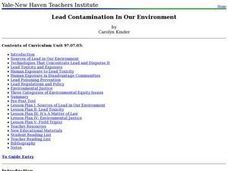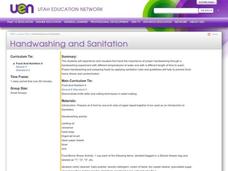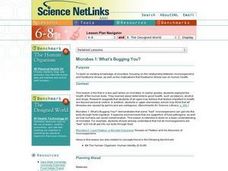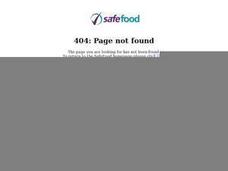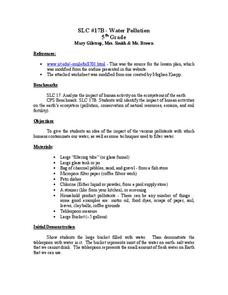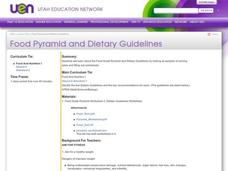Curated OER
Where's the Point?
Students examine runoff for the causes, the impact, and the solution. For this investigative lesson students construct a three dimensional model of a watershed and provide information of contaminated runoff to their audience.
Curated OER
Environment: Just Around the Bend
Students decipher landforms on a map and corresponding satellite imagery. They consider the impact of pollution on agriculture and water. They draw diagrams demonstrating how pollution works its way into the food source.
Curated OER
Health: Food Borne Illnesses
Students discover how to inhibit food borne illnesses by practicing safe food-handling techniques. Among topics they examine are the advantages and disadvantages of using wooden or plastic cutting boards. After studying for the test,...
Curated OER
Lead Contamination In Our Environment
Students identify the sources of lead in their local community and how to prevent further contamination. As a class, they watch a video about the effects of lead on the body and use the internet to discover any new technology that can...
Curated OER
Store to Table: Food Safety (Senior, other)
Students explore their role as food preparation specialists in the prevention of foodborne illness.
Curated OER
Food Chains and Webs
In this food chains worksheet, students identify the producers and consumers in the given food chains and describe how contaminants can biologically accumulate. This worksheet has 4 short answer questions.
Curated OER
Funky Food Farm
Students research about ways to keep food from spoiling. In this health science lesson plan, students design an experiment to keep the ice cubes from melting. They present their designs and results in class.
Curated OER
Handwashing and Sanitation
Students experience and visualize first hand the importance of proper hand washing through a hand washing experiment with different temperatures of water and with a different length of time to wash. They prevent food-borne illness and...
Curated OER
One Part A Mini Lab: Water Contamination
Students investigate the effects of ground water contamination. In this ground water contamination lesson plan, students create a mini well and simulate ground water flow through the well with a contaminate (food coloring). They make...
Curated OER
Bacteria and Illness
Students research information on bacterium and their relationship to food borne diseases. In this science lesson plan, students complete internet research to construct and analyze the growth cure of common bacterium and food-borne...
Curated OER
Real-World Projects: Challenges from the Polymer Industry
Two scenarios are presented for chemistry detectives to decipher. Both require the use of an infrared spectrometer and focus on the examination of polymer materials. In the first, lumps in polyethylene bottles are analyzed. In the...
Curated OER
MICROBES 1: WHAT'S BUGGIN YOU?
Students use existing knowledge of microbes, focusing on the relationship between microorganisms and foodborne illness, as well as the implications that foodborne illness has on human health.
Curated OER
Science: Lead Shot and Waterfowl
Students examine data to investigate the impact of lead shot pellets on waterfowl populations. They graph their findings and discover how lead in ingested by birds and poisons them. As an extension, students research legislation and...
Kenan Fellows
Sustainability: Learning for a Lifetime – The Importance of Water
Water is essential for life—and understanding the importance of clean drinking water is essential in understanding sustainability! Show your environmental science class the basics of water testing and treatment through a week-long...
Curated OER
Finding and Measuring What You Can't See
Young scholars determine how scientists measure pollutants in food and the environment. Students discover how scientists remove one material based on its physical properties. Young scholars figure out how much of a pollutant is present...
Curated OER
Hands of Doom
Students discuss the four essential step used for safe food handling: clean, separate, cook, and chill. They identify the bacteria that can cause food poisoning, practice how to properly wash hands before and after handling food,...
Curated OER
Labelling
Learners assess the difference between "use by" and "best before" date markings on food items bought at a grocery store or some other establishment. They determine whether or not stored food is safe to eat and practice developing...
Curated OER
Water Pollution
Fifth graders investigate how humans pollute the water supply with a number of different contaminates. While working in small groups they examine screening, sedimentation, filtration, and chemical treatments as methods of water treatment.
Curated OER
Water Pollution
Fifth graders observe and record what happens when household products are added to a tank of water to depict water pollution. They brainstorm ideas of how to clean the contaminate out of the water before watching demonstrations of...
Curated OER
Jr. Chef Club Delightful Desserts
Students identify the fat content in foods. For this nutrition lesson, students review the food pyramid and identify foods that are low in fat. Students create a low-fat dessert by using fruit.
Curated OER
The Trail of a Snack Food
Young scholars identify some of their favorite snack foods. Using this information, they discover the resources needed to produce the food. In groups, they research different alternatives to make their favorite food in order to protect...
Curated OER
Food Pyramid and Dietary Guidelines
Third graders complete activities and worksheets to explore the Food Guide Pyramid and Dietary Guidelines .
Curated OER
Leach Out and Touch Someone
Students discuss how groundwater becomes polluted. In groups, they design and create models of groundwater pollution sources. They demonstrate to the class how the water may become contaminated from local and nonlocal pollution sources.
Bridge
Mercury - Mercury is Rising
Hold a discussion in your class about the increase in mercury being found in fish that are caught commercially as food for humans. Given a worksheet, learners then calculate how much fish a person can safely eat each month to remain...





